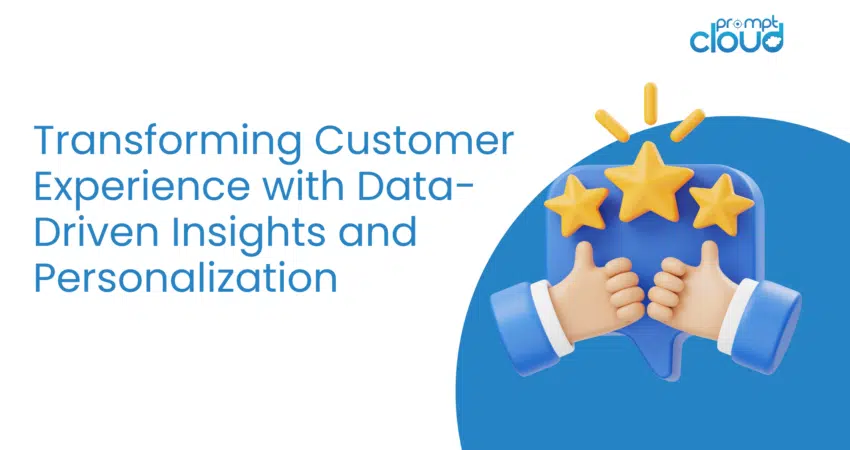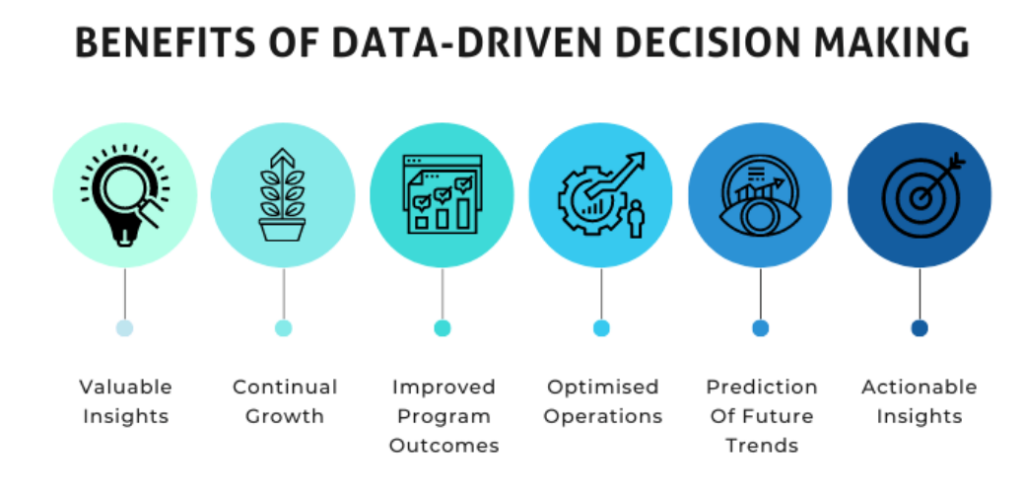
In today’s competitive business landscape, personalization is not just a marketing strategy, but a fundamental component that can significantly differentiate a brand. Leveraging data-driven insights to tailor experiences uniquely to individual customer preferences, behaviors, and past interactions can transform the customer journey into a more engaging and satisfying process. This blog explores how businesses can utilize big data and advanced analytics to deliver personalized experiences that drive customer loyalty and growth.

Source: https://www.analyticsvidhya.com/blog/2023/05/data-driven-decision-making/
The Power of Data-Driven Insights

Source: https://www.newmetrics.net/insights/hyperpersonalization-and-the-future-of-customer-experience/
Understanding Your Customers
In the realm of modern business, understanding your customers goes beyond knowing their basic preferences – it’s about comprehending their behaviors, needs, and decision-making processes at a granular level. Data driven insights and analytics provides this depth of insight by analyzing interactions and engagements across a myriad of touchpoints such as social media activity, website visits, purchase histories, and customer service interactions. By compiling and analyzing this data, businesses can create comprehensive customer profiles. These profiles reveal patterns and trends that inform not only the products and services offered but also the way they are marketed, ultimately leading to a more tailored and effective customer experience. For instance, a business can identify the most preferred products or services and subsequently focus its efforts on promoting these to similar customer segments.
Predictive Analytics
Predictive analytics takes customer understanding a step further by using historical data, statistical algorithms, and machine learning techniques to forecast future behavior. This forward-looking approach allows companies to anticipate needs, preferences, and potential issues before they even arise, enabling proactive rather than reactive strategies. For marketing, this means being able to personalize interactions that resonate at an individual level, such as sending a tailored email with a special offer just as the customer begins their search for a product. In services, predictive analytics can alert a business to when a customer might need support, perhaps even before the customer realizes it themselves. This capability not only improves customer satisfaction but also enhances loyalty, as customers feel understood and valued on a personal level.
Personalization in Action
Customized Recommendations
E-commerce giants like Amazon have set the gold standard for personalized shopping experiences by leveraging data driven insights on purchasing patterns and browsing behavior. Through sophisticated data driven insights and analysis, these companies can construct detailed profiles of individual shopping habits and preferences. This data is then used to power recommendation engines that suggest products tailored to each customer’s interests. For instance, if a customer frequently buys or browses science fiction books, the recommendation system would highlight new releases in this genre, along with related products like sci-fi movies or collectibles. This level of customization not only enhances the shopping experience but also significantly increases the likelihood of purchases by presenting customers with options that directly align with their tastes.
Targeted Marketing Campaigns
Data driven insights and segmentation and predictive analytics have revolutionized how marketers design and implement their campaigns. By analyzing customer data from various sources—such as demographics, past purchase behavior, and social media engagement—marketers can create distinct customer segments that share similar characteristics and preferences. These segments can then be targeted with highly tailored marketing messages. For example, a luxury fashion brand might identify a segment of customers who have shown interest in high-end handbags and target them with ads for their latest collection, perhaps timed around when they typically receive bonuses or tax refunds. Additionally, predictive analytics can forecast the optimal times and channels for reaching these segments, thereby enhancing the effectiveness of advertising efforts and increasing the return on investment.
Implementing a Data-Driven Personalization Strategy
Data Integration
Effective personalization relies on a holistic view of the customer, which can only be achieved by integrating data from multiple sources. Merging information from customer relationship management (CRM) systems, social media interactions, point of sale (POS) systems, and even IoT devices allows businesses to paint a complete picture of customer behaviors and preferences. This integration ensures that every customer touchpoint is informed by comprehensive data, enabling a seamless and personalized customer experience across all platforms. For instance, combining purchase history from a POS with browsing data from an e-commerce site can help tailor the online shopping experience to mirror the customer’s in-store preferences and vice versa.
Technology and Tools
To harness the full potential of integrated data for personalization, businesses must utilize the right tools and technologies. Artificial Intelligence (AI) and machine learning are at the forefront of analyzing large datasets and generating actionable insights. These technologies can identify patterns and preferences within the data that might not be visible to human analysts. Data management platforms (DMPs) collect, organize, and activate data across marketing channels, ensuring that insights are effectively applied to enhance customer interactions. Additionally, customer data platforms (CDPs) unify a customer’s data into a single, comprehensive customer profile that can be accessed by other systems for real-time personalization.
Ethical Considerations
As businesses collect and utilize increasing amounts of data, they must navigate the ethical implications responsibly. Ensuring customer privacy and data security is paramount. This involves transparently communicating what data is being collected, how it is being used, and giving customers control over their information through clear consent mechanisms. Moreover, adhering to regulations such as the General Data Protection Regulation (GDPR) in Europe or the California Consumer Privacy Act (CCPA) in the U.S. is crucial. Ethical use of data not only complies with legal standards but also builds trust with customers, reinforcing that their personal information is handled with care and respect.
Conclusion
Embracing data-driven personalization is not merely a trend but a strategic imperative in today’s digital age. Companies that effectively harness and apply data driven insights to their customer engagement strategies not only enhance the customer experience but also set themselves apart from competitors. As the digital landscape evolves, the potential for personalized customer experiences is limitless.
Are you ready to transform your customer experience with data-driven personalization? Contact PromptCloud today to discover how our data solutions can unlock powerful insights to fuel your personalization efforts. Get in touch with us at sales@promptcloud.com

















